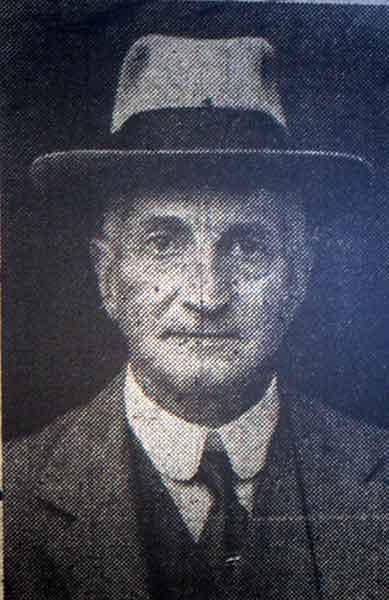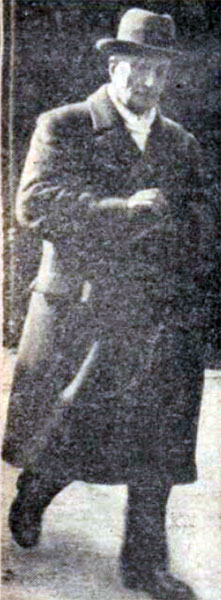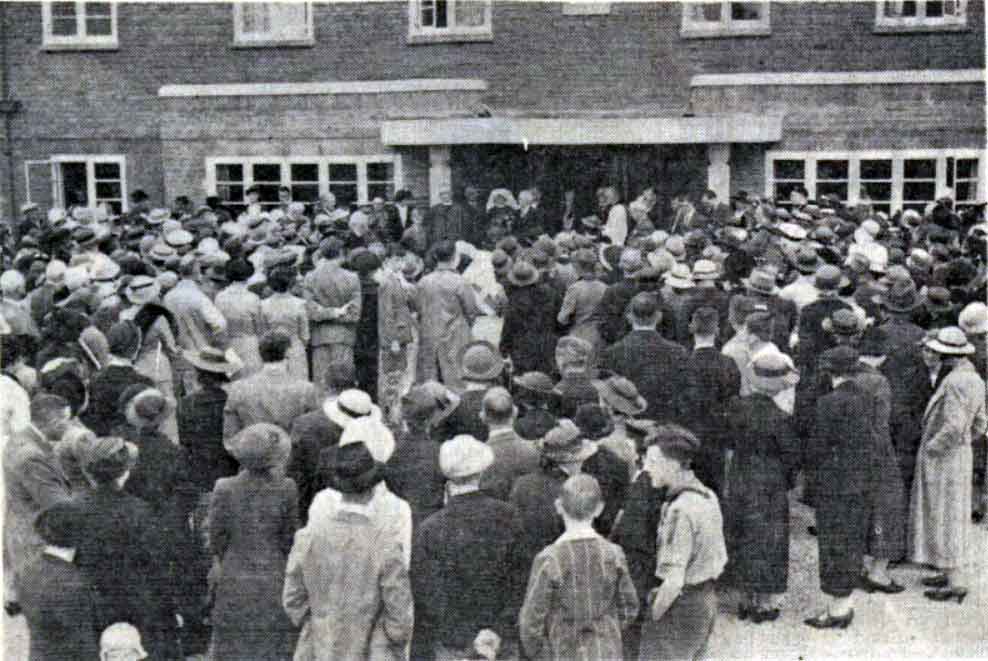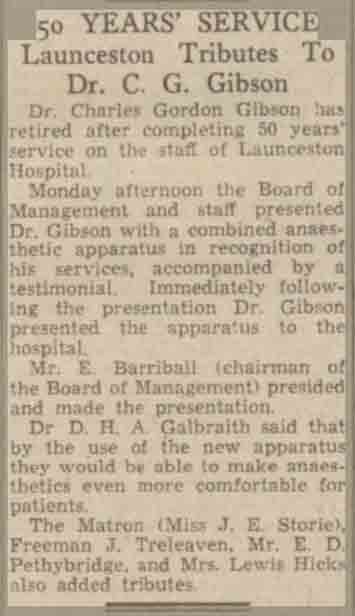
Charles was born in 1865 at Rescobie, Forfarshire (Angus), Scotland to William and Mary Gibson. His father was a Railway Mechanic.
Charles studied medicine at Edinburgh University obtaining an M.B. Masters in 1889. After qualifying he worked as a S W B C M Edinburgh University Registered & Asylum Assistant Medical Officer.
He moved to Launceston in November 1891 and worked alongside Dr. David Thompson at the surgery in Southgate street.
He married Annie Baynes White, daughter of Launceston solicitor George Graham White at Launceston in 1898 and they set up home at North Hall, Dunheved road, Launceston. They had six children in total; Agnes Gordon b. 1900; Maithland Fullerton b. 1901; Charlotte Ellen b. 1903; Annie b. 1904 (who survived a plane crash in 1949); Winifred Mabyn b. 1906 and John.
He became the Medical officer for Launceston and served until his retirement from public life in June of 1941. In 1931 along with Dr. Galbraith he gave evidence at the Anne Hearn trial (seen below left heading for the trial).



Charles died in 1947 at the age of 82.
Just after Dr. Gibson’s retirement in 1941 he reminisced on his career in a ‘Cornish and Devon Post’ article.
Dr. C. G. Gibson, of Launceston, who recently retired after 50 year’s service in the town and district, after some persuasion agreed to our suggestion that he should recount some of his reminiscences and has written the following, which, we feel sure, will be read with interest by many who have been his patients during that long period, as well as by many others, relating as they do, to the days when conditions were very different to those obtaining at present, he says:
I came to Launceston in November 1891, and , as it happened on the evening of the Church Social, for I remember after my first meeting with Dr. David Thompson, at his home in Southgate Street, we walked down together to the Town Hall, where the social was in progress. The people seemed to be having a very enjoyable time, and no doubt hoping to put me at my ease the good doctor introduced me to some of my future patients. But the person who seemed most sympathetic and kindly disposed to the strange young doctor was Dr. Thompson’s own daughter, Mrs. Strong, a lady for whom I have ever retained a most sincere admiration and respect. She is the one remaining representitive of the Thompson’s in Launceston and in her are the same traits of character which made her father and brother such notable and respected townsmen, combined with a lively cheerfulness and geniality all her own.
In those early days the Guildhall was permitted to be fitted with a temporary stage and used for short plays and tableaux. These were often very good and could be thoroughly enjoyed, the Guildhall being well away from the talking and other noisy distractions of the main hall. There were valid reasons for reserving the Guildhall for its proper uses; but the loss to those social gatherings in the Town Hall is one which to my thinking has never been made good.
During my first year in Launceston, I lived with Dr. Thompson at Southgate. Though afflicted with deafness Mrs. Thompson, senior, was a most charming and friendly old lady as I knew her in those days. Oft times it was a pleasant sight to see the big doctor, after work was over for the day, settle down for a game with the little lady; cribbage was their favourite, as her deafness did not matter.
ATTACK OF INFLUENZA.
Only a very few weeks after my arrival influenza became prevalent and one day after a long ride, I ached all over and at first put this down to the unaccustomed exercise; but it was influenza which confined me to bed for the best part of a week. Knowing that patients were getting numerous I then got back to work, but I went down again with a relapse, and poor Mrs. Thompson had me on her hands for another week. I believe they thought they had got hold od a very delicate assistant! Yes, I had influenza “good and proper” at that awkward and annoying time just when I wanted to make a good impression; but since then I have been practically immune!
CATTLE MARKET IN STREETS.
On the Tuesday after my arrival I had my first experience of a St. Leonard’s Fair and what in those days it meant to the town in general, and to the doctors in particular. For the town it meant the busiest day of the year and one of the dirtiest, in those days cattle markets were only held on the 2nd and 4th Tuesdays in each month, and quite often enough it seemed to me, for the market was held in the streets, which in consequence were crowded with cattle for some hours and thereafter were exceedingly filthy till the scavengers could get to work.
PAY DAY DINNERS.
But St. Leonard’s was not only a specially large market, it was also the great annual pay day, when the farming community, having completed the harvest, were perhaps best able to pay their debts. Anyway they were encouraged to do so, for all the prominent firms in the town, including the doctors and veterinary surgeons gave a dinner to those of their country clients who settled their accounts that day. This friendly old custom, savouring of simpler and more leisurely times, was already beginning to disappear with the adoption of more businesslike methods of rendering accounts. The next St. Leonard’s Fair (1892) was I think, the last occasion on which we doctors gave a dinner. It involved hiring a large room known as the Western Room, the purchase and cooking of large rounds of beef, vegetables, currant and suet puddings or fare of that sort, the laying out of long trestle tables with cloths, cutlery and dishes. All this threw a great deal of labour and anxiety upon the doctors wives and their attendants before, during, and after the dinner. The doctors had, perhaps, an easier time at the receipt of custom, seated at as small table which blocked entry to the dining tables until the account was produced and settled. A good deal of cash was this raked in. Quite satisfactory all that, no doubt, and often amusing, for many were the little jokes and sayings which were bandied about, but somehow hardly professional and certainly unbusiness-like, I know it was a great relief to the ladies when the dinner was given up. It may have been in part due to reasons of health, but according to my recollection it was rather from his very strict ideas of what was right and proper that Dr. David Thompson would very seldom accept any refreshment when paying a round of calls, even when he had been much delayed. Much as I respected and learned from my senior partner, I could not follow out his spartan resolution in this matter. I look back with the liveliest pleasure and gratitude to very many delightful, welcome and heartening tea meals provided for me so willingly in hall, villa, farmhouse, and cottage throughout this most hospitable district, when I found it impossible to get home in time for tea. Rising like a giant refreshed from such a meal, whether at home or from the table of a friendly patient. I was for many years good for another six hours of work without a break and my country patients were well aware they were not to give me up before 10 p.m. If they were expecting me. It was not till the period of the last Great War, however, that my rounds often ended at such late hours.
TOLL-GATES.
It was rather the contrast between the conditions of life and practice from forty to fifty years ago and now which may be of some little interest to others. One great contrast lies in the difference between the roads and means of locomotion. When a boy I just remember toll-gates on the main roads out of Edinburgh, my native city, but long before 1891 these hindrances to through traffic along the roads had been abolished. Several of the old toll-gate houses, however, in this district are still inhabited and recognisable as such from their site, shape, and the remains of gate fittings, etc. others are derelict or so greatly altered as only to be recognised from “gate” appearing in the names of the village, as for example Petherwin Gate. The house still known as Dutson Gate, is I think, the best example in this district.
ROUGH TRAVELLING.
Now imagine starting off on a country round fifty years ago in dog-cart with iron tyres. The rain is pouring down so one is wrapping up in a thick water-proof coat with cape. If you have a driver he flings back the waterproof rug and you get seated as quickly as possible, knowing that every stop more rain water will be exploring the weak spots in your defences. At every house your wet garments must be taken off and put on again, and you will be lucky if the rain has not penetrated to your skin somewhere about your sit-upon regions by the time you get home. You are bound for Broadwood, say, and you find the roadmen have just spread a patch of loose road metal over which you jolt at a slow pace. Once through the patch and with a crack of the whip your horse gets back to his jog-trot of about 8 miles an hour. Ahead of you, you soon see another patch of loose metal, but notice with satisfaction that a good many vehicles have been over it before you. Thankfully you get through this patch using the rolled in wheel-tracks they have made, but that stroke of luck is not repeated. Again you see a patch ahead and a roadman at work on it, so you know what to expect. He has carefully raked any loose stones over the smooth tracks, so you jolt and rattle worse than ever and give the man a nod with something between a grin and a scowl.
ADVENT OF STEAM ROLLERS.
In those good old days that is how stones were rolled in; but things were beginning to improve and steamrollers were coming into use. The roads then became really good for cycles and following their lead, traps were fitted with rubber tyres. This resulted in a grateful reduction of wear and tear all round, and not least to one’s nervous system.
LIGHTS COMPULSORY.
About the same time I remember the Order coming into force which made it compulsory for all vehicles to have front and rear lights. Long before that, of course, most careful drivers had lights after dark, but in the said good and slightly older days Dr. Thompson told me it was more exciting than safe to be jogging back to town on a Saturday evening if some of the farmers who had been making-merry in town, decided to finish up racing each other home in the dark and without lights!
THE “NAUGHTY NINETIES.
In the so called “naughty nineties,” the price of whisky and gin had not soared to the stratosphere as now in these unhappy days, but in spite of all temptations to indulge in deep potations I found the generality of farmers in the district as sensible and sober-minded a set of hard working men as were to be found anywhere.
SOME NEAR SQUEAKS.
It was a snowstorm plus some unlighted traps homeward bound from market which gave me a passable sample of former conditions. No other horse being available to get me out to Egloskerry in answer to an urgent call, Mrs. William Thompson kindly offered to drive me out, taking a particularly well bred mare which was her own special pride and possession and which she quite rightly did not care to trust me to drive, knowing I was without experience. As we started home it came on to snow heavily, and, being handicapped with spectacles, my driver got bewildered after one or two near squeaks with market traps, and finally asked me to drive for her, so we changed seats. Well, we got home safely without a scratch and my stock was up, but I refuse to tell how many times I passed a trap on the wrong side!
Bar getting excessively cold hands, which gave me almost unbearable pain, I could always enjoy the novelty and excitement of the many road incidents and accidents that have come my way. At first it was not for nothing that I was known as the gentleman who was unaccustomed to horse exercise, but I never received any serious hurt and have every reason to be thankful for the good health which has enabled me to carry on for so many years.
RETIREMENT.
Latterly, though I have not felt the slightest loss of interest in my patients or their troubles; I had begun to feel too much a slave of the “red lamp,” the old time sign of a doctor’s house, which began to take on rather the shape of a red cross. Man shall not live by bread alone, and I have indeed longed for some rest, and freedom from the responsibility and anxieties inseparable from a doctor’s life if he is to give his best. I hope my patients realise that during the last fifty years there have been far more alterations and additions to medical and surgical science than have taken place on our roads and to our means of locomotion. It has been my endeavour to keep abreast of, and profit by all those advances, which, unlike tarred roads and motor cars, have been life saving. They will then not doubt that the labour has been great. I retired at the end of June on medical advice and readers of the “Cornish and Devon Post” will know of the extra-ordinarily kind and generous expressions of appreciation I have received from the Management and Staff of our very valuable Hospital. I have been offered space in this paper for a few memories of my earlier days in Launceston. How far these prove acceptable ass of local interest, I know not, but if this enterprising recorder of all local events will but give me space to express my heart felt thanks and trust form my ministrations as a doctor in Launceston town and district have called forth, I shall be grateful. In all sincerity and reverence may I pray that God bless you all.
Visits: 76
